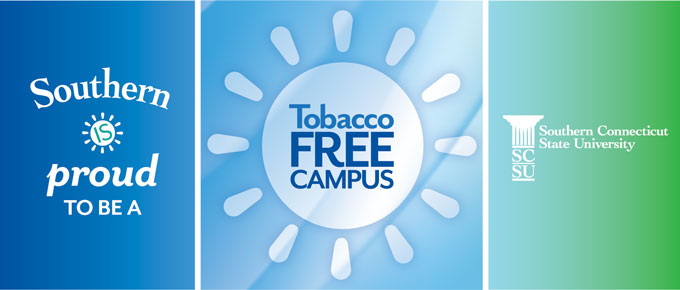Southern Connecticut State University has been awarded the Tobacco Grant from the state Department of Public Health. As of August 25, 2015, the university is a tobacco-free campus, the first public university in Connecticut to implement such a policy. In coordination with this new policy, which will eliminate exposure to second-hand smoke at Southern and prohibits the use of all tobacco products, including e-cigarettes, a multi-faceted state and community intervention was proposed, based on best practices in tobacco prevention and control. The proposed work will sustainably prevent the initiation of tobacco use and promote cessation among young adults at the university, while also building capacity for tobacco control and prevention in the Connecticut State University system.
As part of the grant, the SCSU Health and Wellness Center staff plans to train and empower anti-tobacco youth advocates (Tobacco-Free Ambassadors, or TFAs) to engage and mobilize their peers through campus community outreach, education, demonstrations, and events. The Health and Wellness Center will offer enhanced onsite cessation services for students, including a comprehensive and intensive 8-week intervention facilitated by a clinical professional trained in cessation counseling. Innovative, student-led social media campaigns will highlight social norms, common misconceptions about smokeless tobacco, and exciting events such as flash mobs, film screenings, and e-cigarette exchange events. Southern will lead a statewide coalition with Central Connecticut State University (CCSU), Eastern Connecticut State University (ECSU) and Western Connecticut State University (WCSU) to build university capacity and share best practices in tobacco control and prevention. Through conferences, ongoing technical assistance and on-site consultations, Southern will coordinate state efforts for tobacco-free policies, and support other universities in their efforts to sustain healthy communities for living and learning. As a result of the Tobacco-Free Campus Policy and the proposed programming, the university expects to see rates of tobacco use decline over the next two years as demand for cessation increases and social norms change.
Initial grant funding will allow the university to implement, evaluate, and improve ongoing and comprehensive tobacco prevention programming and collaboration to change social norms and maximize human and financial resources. The proposed statewide coalition will serve as a replicable model for other public and private universities considering tobacco-free policies and hoping to increase efficiency and effectiveness through creative collaboration.
The proposed cost of this multi-faceted state and community intervention is $235,496. Grant funding will support a part-time program coordinator, two expert consultants/trainers, four full-day conferences with partner sites, technical assistance and financial support to subcontractor partner universities, extensive training and support for staff and student workers, cessation aids, permanent signage and promotional items, supplies, and five professional conferences where project leaders will share best practices and a replicable model for tobacco prevention and control policies on campus communities. Subcontractors include CCSU, ECSU, and WCSU, as well as experts in cessation and e-cigarettes to provide specific training, support, and technical assistance to partners and student workers. SCSU Health and Wellness Center staff salaries, including the Principal Investigator and co-Principal Investigator will be paid in full by Southern as an in-kind contribution. Grant funding will cover costs associated with dozens of student-led programs, outreach, and events, including innovative e-cigarette exchange events.


